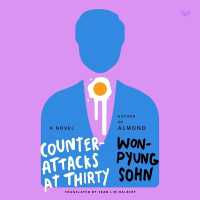- ホーム
- > 洋書
- > 英文書
- > Family / Marriage
Full Description
Conflict Resolution Quarterly, an official publication of the Association for Conflict Resolution (ACR), publishes quality scholarship on relationships between theory, research, and practice in the conflict management and dispute resolution field to promote more effective professional applications.
Contents
EDITOR'S INTRODUCTION. The Emperor's Knew ClothesWill Hurt Us (Tricia S. Jones). ARTICLES. Unlocking the Learning Potential in Peer Mediation: An Evaluation of Peer Mediator Modeling and Disputant Learning (Robert D. Harris) This study of peer mediation in high schools examines whether disputants in peer mediation learn from observing modeling of constructive conflict behavior by peer mediators. It also assesses the extent to which mediators do in fact model effective conflict skills, attitudes, and knowledge. The Murky World of Mediation Ethics: Neutrality, Impartiality, and Conflict of Interest in State Codes of Conduct (Suzanne McCorkle) There are a range of treatments of neutrality, impartiality, and conflict of interest in state codes of conduct on mediation. This article summarizes notable differences and discusses the impact for the field. OF ADR. Dialogue and Democracy, Community and Capacity: Lessons for Conflict Resolution Education from Montessori, Dewey, and Freire (Timothy Hedeen) Conflict resolution education, for all ages, owes a great deal to the foundations of three incredible theorists: John Dewey, Maria Montessori, and Paulo Freire. In this article, their essential theories are discussed in terms of how they provide guidelines and insights for effective conflict resolution education and training. Linking Theory to Practice: A Theory of Change Model of the Natural Resources Leadership Institute (Mary Lou Addor,Tanya Denckla Cobb, E. Franklin Dukes,Mike Ellerbrock, L. Steven Smutko) This article is an overview of the theory of change model that frames the NRLI training and educational process. Although the focus is primarily on environmental and public policy conflict, the model and its training approach have benefits for conflict educators in all contexts of practice. Creating Awareness of the Spiritual Dimensions of Conflict Resolution by Contemplating Organizational Culture (Marsha Lichtenstein) When designing and delivering conflict training for faith based organizations, it is important to consider the values and rituals of the organization as an underpinning for training approaches. Beyond Basic Training: A Model for Developing Mediator Competence (Etty Lieberman,Yael Foux Levy,Peretz Segal) Mediator competence is not attainable and should not be assessed in terms of learning in a short term, concentrated, initial training. These authors share their experience with a reflective, ongoing learning model to establish and assess mediator competence in Israel. What Theory? How Collaborative Problem Solving Trainers Use Theory and Research in Training and Teaching (Julie Macfarlane,Bernie Mayer) Just how important is theory and research to collaborative problem solving trainers? The authors report on a qualitative interview study with a select group of trainers/practitioners. The results suggest an uphill battle for effective inclusion of theory and research in training.








